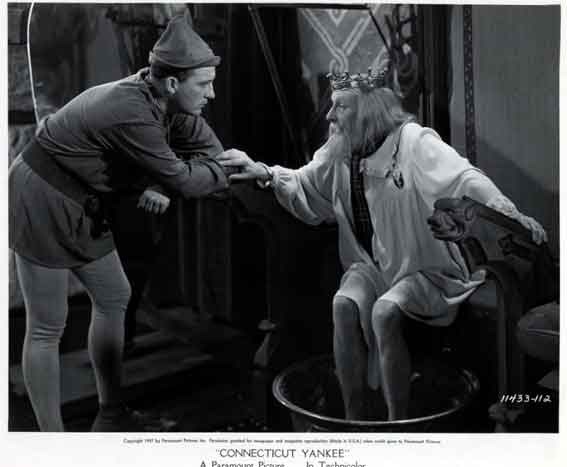
Solar eclipses have provided inspiration to any number of great writers.
In Mark Twain's hilarious "A Connecticut Yankee in King Arthur's Court," a 19th-century American engineer named Hank is transported through time to England during the reign of King Arthur in the year 528. Hank's unfamiliar speech and dress are viewed with suspicion by Merlin the royal magician, who prevails on the king to have the stranger executed. He is sentenced to be burned at the stake at noon on June 21. Fortunately, the condemned man happens to know that a total eclipse of the sun will occur on that day. So he issues a threat:
"Go back and tell the king that at that hour I will smother the whole world in the dead blackness of midnight; I will blot out the sun, and he shall never shine again; the fruits of the earth shall rot for lack of light and warmth, and the peoples of the earth shall famish and die, to the last man!"
The threat works. When the eclipse begins, a frightened King Arthur not only rescinds Hank's death sentence but also agrees to appoint the Yankee his "perpetual minister and executive" if only he will save the sun from being extinguished. Hank agrees and before long, to the great relief of Arthur and his people, "the silver rim of the sun pushed itself out" and the fearsome darkness disappeared.
James Fenimore Cooper was living in the path of a total solar eclipse that passed through central New York on June 16, 1806. He wrote about the experience in an essay that was published in Putnam's magazine after his death.
As in our day, the pre-eclipse anticipation was keen. "Throughout the belt of country to be darkened by the eclipse, the whole population were in a state of almost anxious expectation for weeks before the event," Cooper recounted. "On the eve of the 16th of June, our family circle could think or talk of little else." At the same time, not everyone was prepared to accept on faith what the astronomers were predicting. There were at least a few eclipse agnostics, wrote Cooper, "who did not choose to commit themselves to the belief in a total eclipse of the sun — simply because they had never seen one. … What these worthy neighbors of ours had not seen, no powers of reasoning, or fullness of evidence, could induce them to credit."
Of course the eclipse occurred precisely on schedule. As the edge of the sun began to disappear from view, "an exclamation of delight, almost triumphant, burst involuntarily from the lips of all." Gradually the darkness spread, the temperature dropped, the birds returned to their nests to roost. Cooper was amazed to see stars appear in the midday sky:
One after another they came into view, more rapidly than in the evening twilight, until perhaps fifty stars appeared to us, in a broad, dark zone of the heavens, crowning the pines on the western mountain. This wonderful vision of the stars, during the noontide hours of day, filled the spirit with singular sensations.
Cooper never lost the sense of awe engendered by that eclipse. Nor did he hear anyone speak lightly about it afterward — not then, and not ever. "I have passed a varied and eventful life [and] it has been my fortune to see earth, heavens, ocean, and man in most of their aspects," he wrote, "but never have I beheld any spectacle which so plainly manifested the majesty of the Creator, or so forcibly taught the lesson of humility to man, as a total eclipse of the sun."
A solar eclipse was central to what some consider the greatest science fiction story ever written — Isaac Asimov's "Nightfall," published in 1941 (see "The Last Line", below). The inspiration for the story was a quote from Ralph Waldo Emerson: "If the stars should appear one night in a thousand years, how would men believe and adore, and preserve for many generations the remembrance of the city of G od!"
Asimov, who was then a graduate student at Columbia, imagined that the reaction would be very different. His brilliant story depicts a planet with multiple suns, where night was an unknown phenomenon — except once every 2,049 years, when a total eclipse plunged the planet into temporary darkness. The impact of experiencing night-like darkness is not rapturous adoration but psychological terror, and cultural effects that persist for generations.
John Milton, the renowned 17th-century English poet, was blind for the last 20 years of his life. He drew upon his fate when he wrote his poem "Samson Agonistes," about the Israelite hero who is captured and blinded by the Philistines. In powerful, poignant words,
Milton describes the loss of sight to experiencing a total solar eclipse:
O dark, dark, dark, amid the blaze of noon,
Irrecoverably dark, total Eclipse
Without all hope of day!
O first created Beam, and thou great Word,
Let there be light, and light was over all;
Why am I thus bereav'd thy prime decree?
The Sun to me is dark
And silent as the Moon,
When she deserts the night
Hid in her vacant interlunar cave.
Milton's lines convey Samson's acute sense of despair and spiritual darkness as he wrestles with the darkness that has overtaken him. For his tragic hero, that metaphorical path of totality will end only with death. Happily, nothing so dark awaits the many millions of Americans who will find themselves in the actual path of totality when the moon's shadow races across the country on April 8, watching with wonderment as day, for just a few minutes, turns into night.
Jeff Jacoby is a columnist for The Boston Globe, from which this is reprinted with permission."


 Contact The Editor
Contact The Editor
 Articles By This Author
Articles By This Author